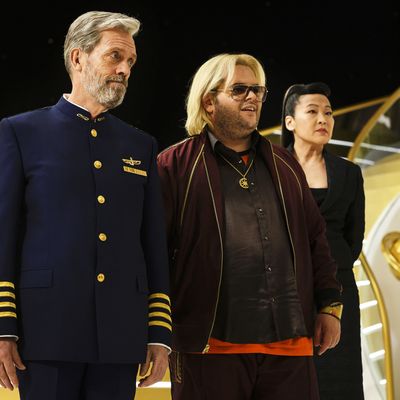
At a certain point in the first episode of Avenue 5, premiering on HBO this Sunday, Hugh Laurie’s accent starts to slip. He’s supposed to be playing the ruggedly charming, always in control, purely American captain of the space cruise ship that gives Armando Iannucci’s new show its title. But the pressure is getting to him as a massive ship-wide malfunction leads the vessel to veer three years off course. The more inflamed he gets, the more British he sounds, until his mask slips entirely in front of Avenue 5’s loathsome billionaire owner Herman Judd (Josh Gad), his righthand woman Iris (Suzy Nakamura), and the ship’s second engineer Billie (Lenora Crichlow). Turns out he’s not American at all, which is only the first in a series of reveals.
Avenue 5 is predicated on such turns, in which revelations about the ragtag group of people aboard the ship and the increasingly harrowing high jinks that define their predicament are awkwardly wrenched into the light for maximum humor. The dynamic between the ship’s engineers, crew members, passengers, and owners is combustible, inviting moments that mine the inherent tension of an interplanetary cruise ship with limited resources stuck in flight for three years instead of eight weeks. How long can order last on the ship, given the dwindling resources and the volatile relationships between people like the oddly nihilistic and unflappable Matt (Zach Woods), head of customer relations aboard the ship, and the passengers themselves? Will relationships mend or will chaos erupt? When severed from the life they knew and expected to live, who will these characters become?
I’ve seen four episodes provided for review, and so far Avenue 5 is silly, sometimes uproarious, and even occasionally moving as it explores these questions. The series takes a minute to find the right rhythm, which it unfortunately can’t maintain with any regularity, but there’s a spark of imagination and enough narrative complication to make the show an intriguing watch as it attempts to find its balance.
A question that kept floating through my mind watching the first episode, though, is whether I really want to spend time with half of these people, week in and week out. As with Iannucci’s Veep, certain Avenue 5 characters are primed to annoy, like the endlessly bickering couple of Mia (Jessica St. Clair) and Doug (Kyle Bornheimer), whose cutthroat dynamic feels neither revelatory nor entertaining. The same can be said of Gad’s Herman Judd, a skeezy, insipid billionaire who thinks himself a genius. Most infuriating is Karen Kelly (Rebecca Front), the kind of white woman who seems ready to ask for the manager the moment she walks through the door. At one point Laurie’s Ryan Clark calls her a “cattle prod in a dress,” an apt summation of the experience of watching her steamroll over characters to get her way without a second thought about how easily everything can devolve into chaos.
But even with characters like these impeding my enjoyment of the series, there are enough intriguing figures to offset them. Lenora Crichlow has a spiky, warm energy that becomes beguiling as she guides Ryan into seeing the truth of the situation they’re in. There’s Rav (Nikki Amuka-Bird), whose no-nonsense fearsomeness adds weight to the situation. And Laurie proves excellent as Ryan, who gains more dimension and a dark undercurrent as the show continues to explore his character and predicament. He’s far more broken than he first comes across, partly because he’s playing a role on multiple levels, a narrative line about the nature of reality and the self that I hope the show continues to explore.
As Avenue 5 progresses, the writers become increasingly adept at putting Ryan in tense situations that reveal further layers of his character, as well as the world he inhabits. Part of the fun in watching Avenue 5 is piecing together its gleaming, technologically advanced vision of the near future. While we aren’t given an exact year this is all taking place, the show scatters puzzle pieces throughout its world that give us a broader picture of these characters’ circumstances. Judd mentions his fear that he’ll die the same way Richard Branson did in this universe: fed to pigs on his private island. Ryan opens a bottle of 2024 wine and Karen remarks it was the hottest year on record. Karen also mentions, in one of the many moments she grabs a microphone, that cattle no longer exist. Sometimes these tidbits feel bluntly rendered, calling too much attention to themselves rather than feeling like a natural part of the fabric of these characters’ lives. But they intrigue nonetheless, leading to questions I hope spill into the show going forward, particularly about the mores and dynamics of this world and how those influence the ship’s social stratum.
There are moments in the third and fourth episodes that tease out some of these curiosities, but I’m excited for the show to dig deeper and take even bigger risks, especially when it comes to rounding out its characters. But even with some early stumbles, Avenue 5 offers such a rich view of the future and such dynamic predicaments that I feel compelled to go along for the ride.


